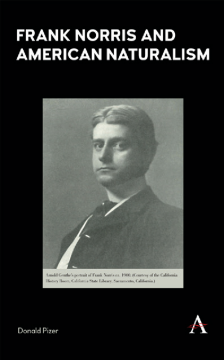
Additional Information
Book Details
Abstract
Frank Norris is a seminal figure in the history of American literary naturalism despite the brevity of his career. Frank Norris and American Naturalism brings together in one volume Donald Pizer’s lifelong exploration of the naturalist’s work, ranging from his 1955 discussion of point of view in The Octopus to his 2010 essay on the thematic unity of that novel. The essays in Frank Norris and American Naturalism as a whole seek to demonstrate both the coherence of Norris’s thought and his contribution toward the establishment of a specific form of naturalism in America. The collection’s principal focus is Norris’s most enduring works, the novels McTeague and The Octopus, though his other fiction and literary criticism are also discussed.
‘Frank Norris and American Naturalism’ brings together in one volume Donald Pizer’s lifelong exploration of Frank Norris’s work, ranging from his 1955 discussion of point of view in ‘The Octopus’ to his 2010 essay on the thematic unity of that novel. The essays as a whole seek to demonstrate both the coherence of Norris’s thought and his contribution toward the establishment of a specific form of naturalism in America. The collection’s principal focus is Norris’s most enduring works, the novels ‘McTeague’ and ‘The Octopus’, though his other fiction and literary criticism are also discussed.
Although Norris died at 32, his literary output during his brief career has played an important role in efforts to interpret the nature of American naturalism. He was one of the few naturalists to write literary criticism, a body of writing which casts much light on his self-conception as a naturalist, and his novels ‘McTeague’ and ‘The Octopus’ rely on two of the most distinctive forms of naturalistic fiction—the sensationalistic novel of violence and the panoramic novel of social protest. Furthermore, though he was deeply indebted to Zola’s fiction, he broke free of Zolaesque themes in ways which are significant for most later American naturalists. Thus, despite the brevity of his career, Norris is a seminal figure in the history of American literary naturalism.
“As a collection of Pizer’s most significant essays on Norris, Frank Norris and American Naturalism gathers in one place a cluster of essays that reminds us of why Norris is worth studying in the first place—and then goes on to demonstrate an admirably lucid and captivating approach to Norris’s major novels and literary criticism.”
—Keith Newlin, Professor, Department of English, University of North Carolina Wilmington, USA
Donald Pizer has had a distinguished career as a critic and editor of late nineteenth- and early twentieth-century American literature and as an interpreter of the history and nature of American literary naturalism. Among his most well-known works are Realism and Naturalism in Late Nineteenth Century American Literature and The Theory and Practice of American Literary Naturalism. Pizer’s books about Frank Norris include a critical study The Novels of Frank Norris and editions of The Literary Criticism of Frank Norris and McTeague; he has also edited the Library of America volume, Frank Norris: Novels and Essays.
Table of Contents
| Section Title | Page | Action | Price |
|---|---|---|---|
| Cover | Cover 1 | ||
| Front Matter | i | ||
| Half-title | i | ||
| Series information | ii | ||
| Title page | iii | ||
| Copyright information | iv | ||
| Table of contents | v | ||
| Preface | vii | ||
| Editorial note and acknowledgments | xi | ||
| Chapters | 1 | ||
| Criticism | 1 | ||
| Introduction: The Literary Criticism of Frank Norris | 3 | ||
| 1 | 3 | ||
| 2 | 6 | ||
| 3 | 8 | ||
| Notes | 11 | ||
| Frank Norris’s Definition of Naturalism | 13 | ||
| Notes | 16 | ||
| Frank Norris and the Frontier as Popular Idea in America | 17 | ||
| Notes | 29 | ||
| Vandover and the Brute and McTeague | 33 | ||
| Evolutionary Ethical Dualism in Frank Norris’s Vandover and the Brute and McTeague | 35 | ||
| 1 | 35 | ||
| 2 | 40 | ||
| 3 | 44 | ||
| Notes | 48 | ||
| McTeague and American Naturalism | 53 | ||
| Notes | 59 | ||
| The Problem of Philosophy in the Novel | 61 | ||
| Notes | 68 | ||
| The Biological Determinism of McTeague in Our Time | 69 | ||
| Notes | 74 | ||
| Frank Norris’s McTeague: Naturalism as Popular Myth | 77 | ||
| Notes | 82 | ||
| The Popular Novels | 83 | ||
| The Masculine–Feminine Ethic in Frank Norris’s Popular Novels | 85 | ||
| 1 | 86 | ||
| 2 | 90 | ||
| Notes | 92 | ||
| The Octopus | 93 | ||
| Another Look at The Octopus | 95 | ||
| 1 | 95 | ||
| 2 | 98 | ||
| 3 | 99 | ||
| Notes | 101 | ||
| The Concept of Nature in Frank Norris’s The Octopus | 103 | ||
| Notes | 109 | ||
| Synthetic Criticism and Frank Norris: Or, Mr. Marx, Mr. Taylor and The Octopus | 113 | ||
| Notes | 121 | ||
| Collis P. Huntington, William S. Rainsford and the Conclusion of Frank Norris’s The Octopus | 123 | ||
| Notes | 139 | ||
| End Matter | 141 | ||
| Index | 141 |
